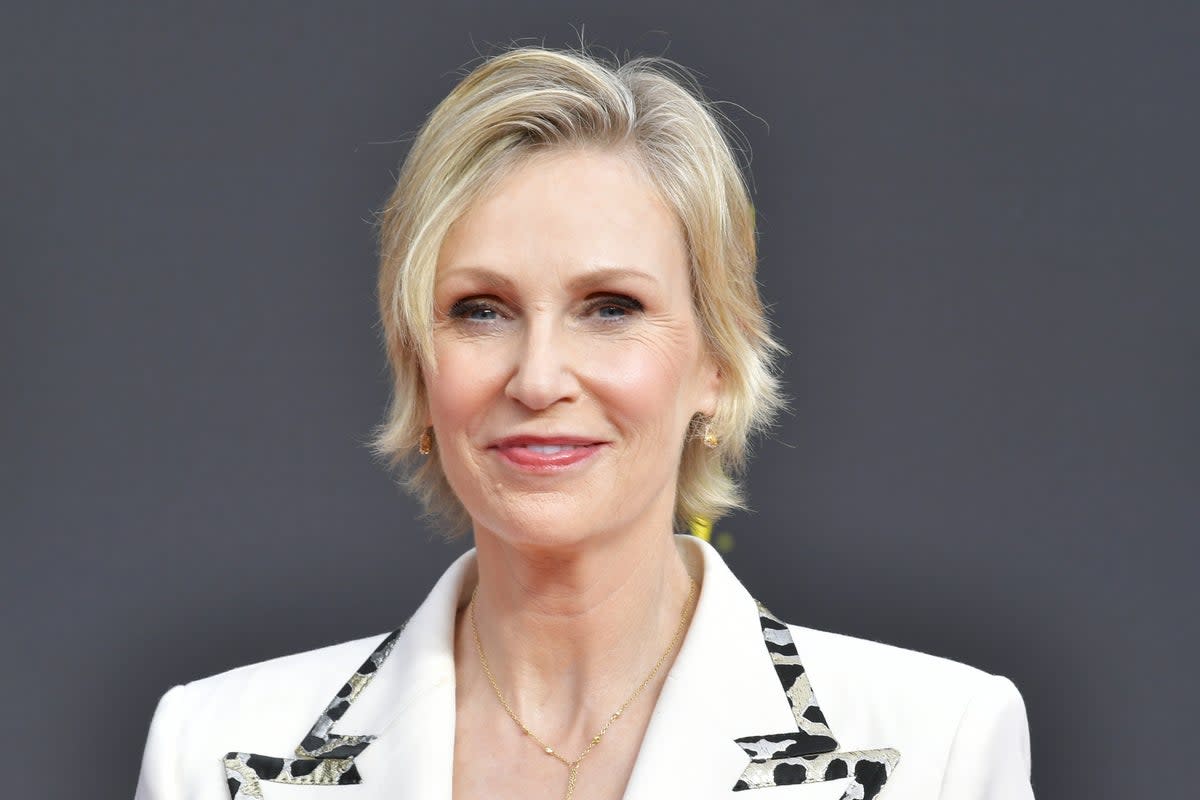Jane Lynch accused of ‘sexism’ and ‘misogyny’ after suggesting women speak in lower voice pitch on podcasts

Jane Lynch has sparked criticism after suggesting that women should consider lowering their “pitch” when recording podcasts because their “voices can get into the annoying area if it gets too high”.
The Glee star, 62, shared her recommendation on Twitter on Monday and prefaced the tweet by noting that she “loves women” and that she is a woman.
“I love women. I AM a woman. Our voices are higher than men’s voices. Women’s voices can get into the annoying area if it gets too high. If you’re doing a podcast, consider lowering your pitch a tad,” she wrote. “If you think I’m being sexist about this then I don’t know what to do with you.”
Many people have since called out the post for being “sexist,” with some accusing the actor of “internalised misogyny”.
“Internalised misogyny is still misogyny. ‘If you don’t understand that, I don’t know what to do with you.’ Stop telling women to be less like themselves and more like what the patriarchy wants. That is actually the very definition of sexism,” one person tweeted.
Another said: “Women’s voices can get to the annoying area if they speak their internalised misogyny.”
“Jane, I love you. But no. The issue isn’t that women’s voices are more annoying than men’s. It’s that we’ve been conditioned to think of men’s voices as the default and women’s voices as ‘other’. Let’s listen to more women, as they are, and appreciate what they bring to the table,” someone else wrote.
I love women. I AM a woman. Our voices are higher than men’s voices. Women's voices can get into the annoying area if it gets too high. If you’re doing a podcast, consider lowering your pitch a tad. If you think I’m being sexist about this then I don’t know what to do with you.
— Jane Lynch (@janemarielynch) July 25, 2022
In response to the tweet, another woman asked “why can’t we just… live?”
“This is, in fact, the definition of sexism,” author Bess Kalb added.
This is, in fact, the definition of sexism.
— Bess Kalb (@bessbell) July 26, 2022
According to someone else, it isn’t the “pitch” that needs to change, but rather the “perception of what is ‘annoying’”.
Would it be ok to tell all blond people to go brunette because the glare of the sun off of their hair hurts your eyes? No. This isn't ok to say either. Listen to whatever podcasts you want but stop policing people's speaking voices.
— Megan SnakeBite (@megansnakebite) July 26, 2022
Literal tone policing https://t.co/i8Od6wCx09
— GUN_Vanguard, They Who Are Here (@GUN_Vanguard) July 26, 2022
I don't know what to do with me either, but this is sexist. Turns out you can do sexism as a woman. It's called internalized misogyny. https://t.co/KU5xCTzPCU
— Accountability Pilled (@Gilliunion) July 26, 2022
i think celebrities should be banned from twitter https://t.co/esCpTZDphI
— ☔ sy 🌈 (@saImineo) July 26, 2022
The tweet also prompted a reply from journalist Femi Redwood, who acknowledged the importance of a “diversity of voices” in media.
“On-air journalist and managing producer of podcasts here. Nope. Be yourself. Speak the way you naturally do. Diversity in media includes diversity of voices (literally),” she wrote.
On-air journalist and managing producer of podcasts here. Nope. Be yourself. Speak the way you naturally do. Diversity in media includes diversity of voices (literally). https://t.co/8RNYTLsOzZ
— Femi Redwood (@femiredwood) July 26, 2022
Lynch’s suggestion also prompted many to draw comparisons to the character she played on Glee, Sue Slyvester, who frequently bullied high school students.
“Not her actually being Sue Sylvester in real life,” one person tweeted, while another said: “This is the most aggressively Sue Sylvester tweet I’ve ever seen.”
While most of the responses to Lynch’s suggestion were critical, there were some who agreed with her on the basis that voice work takes “practice”.
“This is true. Most women do not speak in their natural range. It takes practice, training and for some (like me) ongoing work,” TV personality Carol Roth said. “If you are going to use your voice professionally, it’s worth the work.”
Others suggested that those who speak on podcasts should focus on eliminating vocal fry, when the voice is at its “lowest natural register,” or the use of “like”. “And up-speak, where every sentence ends like they are asking a question - I don’t know when that became a thing,” someone else said.
Examine your internalized misogyny, bestie! Is it really just a biological reality that only high voices (and vocal fry and uptalk and etc.) are considered "annoying"? https://t.co/HNUOkip8vJ
— Lauren O'Neal (@laureneoneal) July 27, 2022
While Lynch did not address the backlash, she did respond to a tweet from an individual who identified themselves as a sound engineer and claimed that adjusting a “person’s voice so that it’s pleasing to the ear” is “easily done” with computer software.
“‘... to adjust a person’s voice to a more pleasing frequency.’ Thanks, @DJJoeG!” Lynch wrote in response to the claim.
She also agreed that her tweet doesn’t just apply to women after someone suggested that her claim about high pitches “goes for Ben Shapiro as well,” to which Lynch wrote: “Yes it does.”
The Independent has contacted a representative for Lynch for comment.


